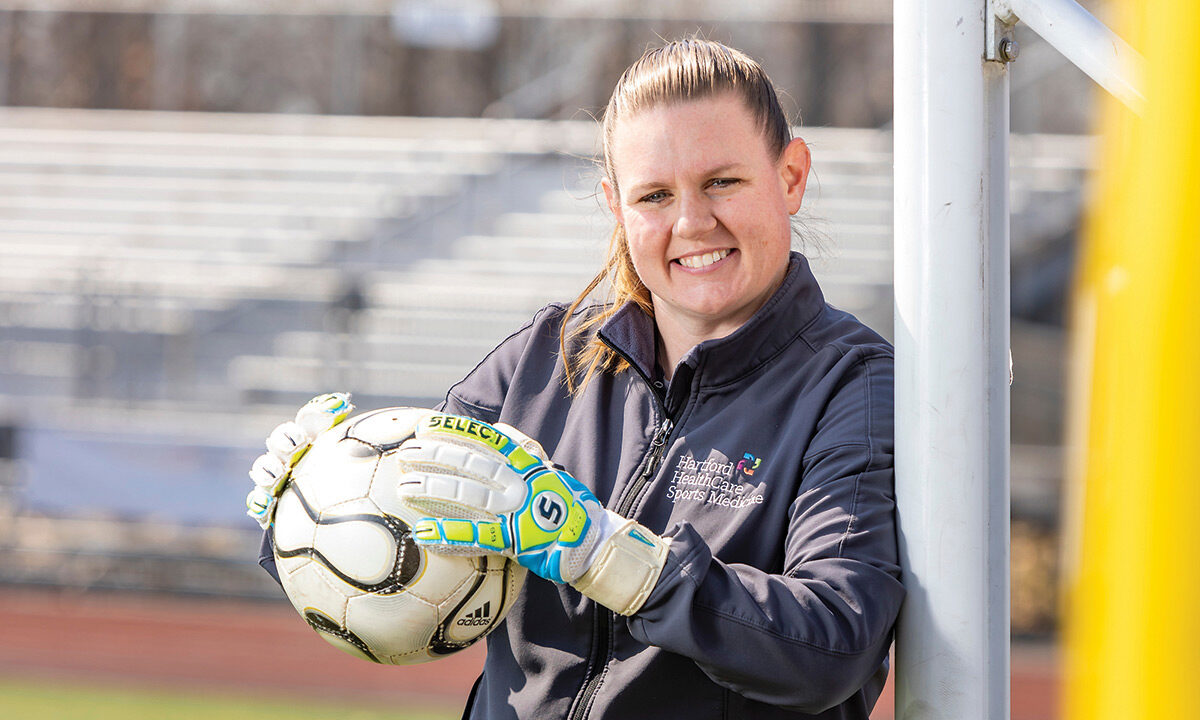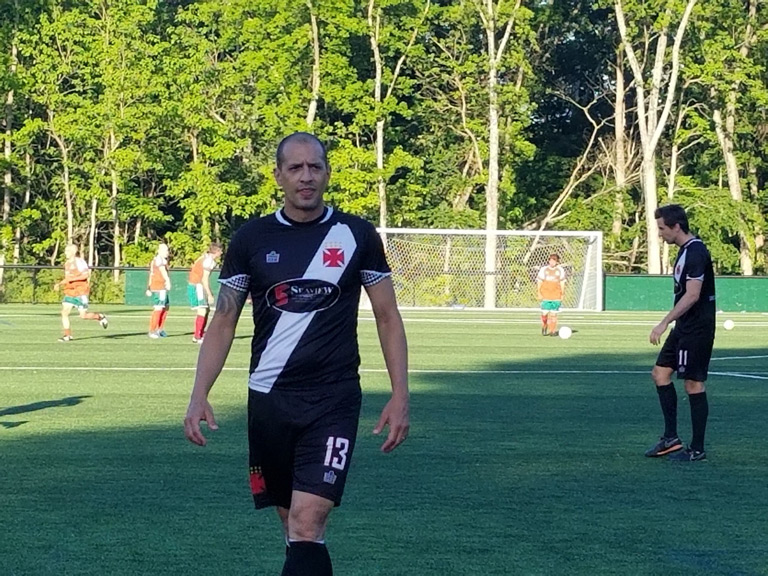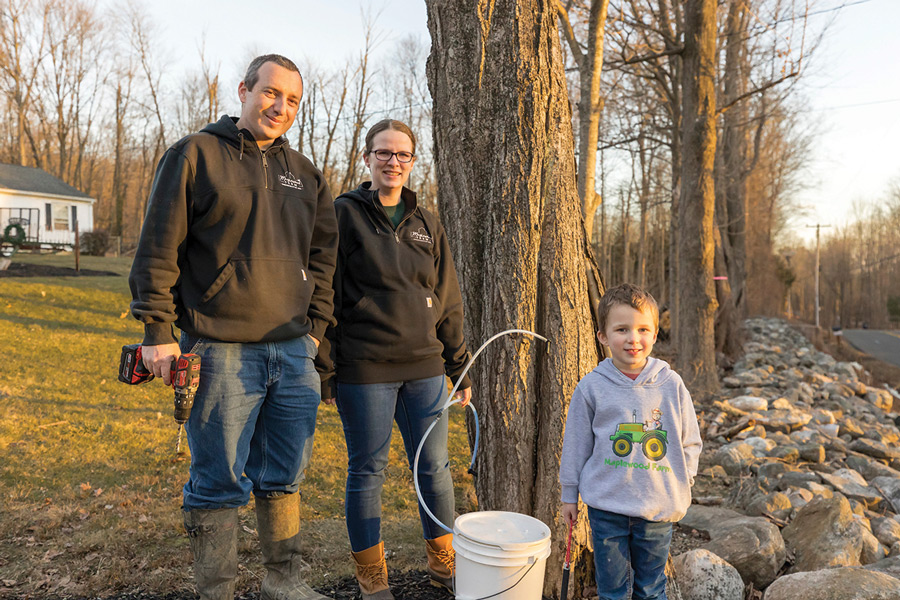This is Us
Hartford HealthCare might be where we work, but when we asked you where you find fun, relaxation or deeper meaning in your lives, we were astonished at the variety of hobbies and activities you pursue in your spare time. Here are a few of those stories, and we’ll have more in upcoming issues of Moments. To share your hobby, email susan.mcdonald@hhchealth.org.

A college injury may have ended Stefanie Bourassa’s bid for the national soccer team, but she finds it rewarding to coach teams these days. Photo by Chris Rakoczy
Player Turned Coach Taps H3W on the Sidelines
Stefanie Bourassa, DPT - Sports Medicine Program Manager Bone & Joint Institute, Hartford Hospital Rehabilitation Network
Stefanie Bourassa, Sports Medicine Program manager, has been with Hartford HealthCare for a decade. She began playing soccer at age 5 and continued through college, playing Division I for the University of Hartford. After graduation, she transitioned to coaching, which allows her to give back to the sport that helped her become who she is today.
What made you want to coach?
The day before my tryout for the national team, I tore my ACL, MCL and medial meniscus. Although I had a good chance of making the team, I, unfortunately, did not get to try out. My injury sidelined me enough that I needed to retire from playing. However, I still had a big passion for soccer. Coaching was an opportunity for me to continue to be involved in the sport.
What do you enjoy most about coaching?
I enjoy many things from being outdoors to sharing leadership journeys with young athletes. Seeing the impact you can make on a kid’s life is gratifying. Many of the goalkeepers I trained have gone to play anywhere from Division III to Division I level soccer. It is great to see, especially coming out of a public school.
What are your core values as a coach?
My three main values are caring, integrity and compassion. To lead your team in the right direction you have to care about the players, the sport and the rules. I teach my players about the integrity of the sport, their teammates and their opponents. Instead of focusing on a win or a loss after a game, I encourage them to think about what they did well and what they learned from their opponents.
I have even taken the “How Hartford HealthCare Works” leadership behaviors and transformed them into team-building exercises. It shows both great communication and negotiation styles from the players.
What advice would you give a new coach?
The same coaching style does not work for everybody. As a coach, you have to recognize both the strengths and weaknesses of every single player, in every single team as a unit. You have to adapt and learn what works best for your players, although it might not be the same style of coaching done the year before. Take everything as an opportunity, especially players’ weaknesses. Too many new coaches put all their focus on the wins and losses without developing their players first. If you have a good, cohesive team and work on both skill development and team building, the game itself will come.
—Maggie Werner

Dr. Pedro Coutinho has played soccer his whole life, and now plays for various men’s leagues.
Neurosurgeon Goes to Church Every Sunday, In Cleats
Dr. Pedro Coutinho - Neurosurgeon, Ayer Neuroscience Institute
Dr. Pedro Coutinho is a neurosurgeon with the Ayer Neuroscience Institute, specializing in minimally-invasive and complex spine surgery. Originally from Brazil, Dr. Coutinho moved to the United States to improve his clinical skills and joined Hartford HealthCare in 2020. When he is not in the operating room, he’s just as laser focused on the soccer field where he plays in men’s leagues.
When did you start playing soccer?
I have been playing soccer since I was four years old. I usually play as a left wing.
Is this a hobby or are you on any teams?
Both. I play pick-up games with friends on Thursday nights and an over-40s state league on Sundays..
What is your favorite part about playing?
I love all aspects of playing soccer, including picturing the game in my mind the night before, getting ready early in the morning and meeting my teammates on the field to discuss tactics before the game starts. I love playing, and discussing the game with my teammates while we have a few beers after the game.
Do you have any favorite memories from your time playing?
I was playing in an over-30s league at a Portuguese club located in Bridgeport called Vasco da Gama and we made it to the State Cup finals in 2019. It was a tough game against the team from Danbury. Although we were the underdogs, we ended up winning the game and becoming state champions! It was a fun day!
Are there any skills you learned from soccer that you apply to your everyday life?
Competitive soccer, just like other collective sports, teaches you how to work as a team, about humbleness when you lose or disappoint your teammates, and how good it is to win after working hard. It shows you how important it is to hear supportive words when you underperform.
Do you worry about injuries or take steps to avoid them since you are a neurosurgeon?
I simply do not. It is what I like doing the most after being with my family. I have broken both ankles playing on different occasions when I was already a fully trained neurosurgeon. Being a neurosurgeon has never stopped me from resuming playing after recovering from any kind of injury, even after the serious ones. I guess I’ll play until I’m elderly.
Was soccer a big part of your family life growing up?
Soccer is like religion where I come from. We play and talk about it all the time. Every time I talk to my father on the phone, even nowadays, we always touch base about what’s going on in the soccer world. We always ask each other about our games. Yes, he still plays every week. He’s going to turn 68 years old this September.
—Robin Stanley

Spencer and Kristen Luthy pose with their son, Hunter, with one of the 400 trees they tap for maple syrup on their Harwinton farm.
Therapist Taps into Sticky Sweetness
Kristen Luthy, PT, DPT Physical Therapist - Hartford HealthCare Bone & Joint Institute
For six years, Kristen Luthy has been a physical therapist on the inpatient unit in the Bone & Joint Institute at Hartford Hospital. When she is not at work, she can be found harvesting maple syrup in her sugar shack.
How did you start harvesting maple syrup?
Eleven years ago, my husband, Spencer, and I got involved with a friend of ours whose father
introduced it to us. We instantly fell in love with the process. After getting married and buying our own house, we realized we had enough land to make our own sugar shack. It just grew from there. We started with just one or two taps and a bucket for each tree, which quickly turned into more than 400 taps across multiple locations with lines and tanks. This all now takes place at our farm, Maplewood Farm, in Harwinton.
Can you explain the process from start to finish?
We start by tapping the trees. In order to get the sap flowing, the nights have to be below freezing. The lines and tanks collect all of the sap. We then bring it all back to the tanks behind our sugar shack, where it gets stored.
We transfer the sap into a deep pan, where it’s boiled down to a syrupy consistency. There is no way it all fits in the pan at once, so we slowly add more as the sap boils. It takes a while to get the sap down to a syrup consistency. The ratio of sap to syrup is about 40 to 43 gallons to one.
After the syrup boils, we bottle it up. It must reach 180 degrees Fahrenheit in order to be appropriately bottled. From there, we sell it from a little stand at the end of our driveway and at some local places in town. We made 60 gallons of syrup last year and sold around 50 gallons, saving the rest for family, friends and ourselves.
What do enjoy most about harvesting maple syrup?
Staying connected to nature and trying to stay outside in a very fast-paced, electronic world. The process cannot be electric. So, rain or snow, we are still out tapping trees. It is also a great family activity for us because everybody likes something different about the process. My husband enjoys teaching our 4-year-old, Hunter, about it and seeing how interested he is. It gets him very involved, especially because he loves tapping the trees. We also just welcomed 7-month-old twins, so this will be their first year.
What’s your favorite way to enjoy maple syrup?
Definitely on pancakes. We have it on pancakes, sweet potatoes and on vanilla ice cream. We have included it in recipes; it is a good sugar substitute. If you do not have white sugar, it is a one to one ratio — one cup of white sugar to one cup of maple syrup, but it must be the pure stuff. Most of all, I just love tasting the syrup. Fresh, right out of the pan, is usually the best. Something fun to do when there is snow on the ground is to toss the hot syrup right on the ice-cold snow. It cools down and makes a taffy-like candy, a fresh treat right from the pan.
—Maggie Werner
